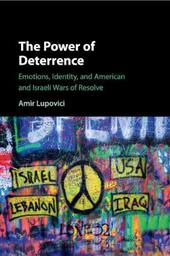
|
The Power of Deterrence: Emotions, Identity, and American and Israeli Wars of Resolve
Paperback / softback
Main Details
| Title |
The Power of Deterrence: Emotions, Identity, and American and Israeli Wars of Resolve
|
| Authors and Contributors |
By (author) Amir Lupovici
|
| Physical Properties |
| Format:Paperback / softback | | Pages:242 | | Dimensions(mm): Height 230,Width 150 |
|
| Category/Genre | Social and political philosophy |
|---|
| ISBN/Barcode |
9781316507759
|
| Classifications | Dewey:355.0217 |
|---|
| Audience | | Professional & Vocational | |
|---|
| Illustrations |
3 Line drawings, black and white
|
|
Publishing Details |
| Publisher |
Cambridge University Press
|
| Imprint |
Cambridge University Press
|
| Publication Date |
15 November 2018 |
| Publication Country |
United Kingdom
|
Description
Why do states persist in using force to enhance their deterrent posture, even though it is not clear that it is effective? This book develops an innovative framework to answer this question, viewing deterrence as an idea. This allows the author to explain how countries institutionalize deterrence strategy, and how this internalization affects policy. He argues that the US and Israel have both internalized deterrence ideas and become attached to these practices. For them, deterrence is not just a means to advance 'physical' security, but it constitutes their very selves as deterring actors. As a result, being unable to deter becomes a threat to their identity, evoking strong emotional responses. In recognizing these dynamics, the book provides a fresh perspective on the US war in Iraq (2003) and the Israeli war in Lebanon (2006), both of which can be seen as attempts to repair each country's shaken sense of self.
Author Biography
Amir Lupovici is a Lecturer in the Department of Political Science at Tel-Aviv University. His research interests include constructivism, cyberspace, securitization, and deterrence. His previous publications have appeared in, among others, International Studies Quarterly, the Review of International Studies, the International Studies Review, and Foreign Policy Analysis.
|